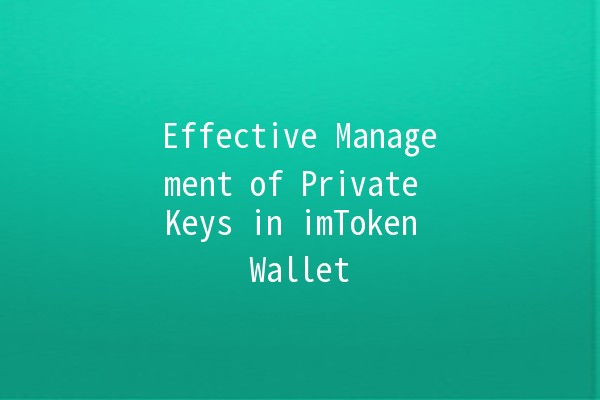In the era of digital assets and cryptocurrencies, the security of your holdings is paramount. The imToken wallet, a popular mobile wallet among cryptocurrency enthusiasts, makes it easy to manage your digital assets but places the onus of security firmly in the hands of its users. One of the essential aspects of this security is the management of private keys. This article delves into best practices for private key management in the imToken wallet and shares productivityenhancing techniques that can help you keep your assets secure.
Private keys are cryptographic keys that provide you access to your cryptocurrency holdings. Unlike a username and password, which can be reset or recovered, a private key is unique and irreplaceable. If someone gains access to your private key, they can control your funds. The principle of "not your keys, not your coins" highlights the importance of safeguarding your private keys when using digital wallets, including imToken.

To effectively manage your private keys while using the imToken wallet, consider the following practical tips:
The first step in managing your private keys is to generate them securely. Avoid using any thirdparty applications to create or store keys. Instead, use the imToken wallet’s builtin key generation feature.
Application Example: When you first create a wallet on imToken, ensure that the generation process is done offline to avoid exposure to online vulnerabilities.
When setting up your imToken wallet, you'll be given a mnemonic phrase. This is a humanreadable representation of your private key and is essential for recovering your wallet.
Application Example: Write down your mnemonic phrase on paper and store it in a safe place, such as a safe deposit box. Avoid saving it digitally to reduce the risk of hacking.
Multisignature wallets require multiple private keys to authorize a transaction, adding an additional layer of security. If an attacker gains access to one key, they will not have full control over your assets.
Application Example: Set up a multisignature wallet using imToken or another compatible service. This approach is ideal for organizations or groups managing a shared fund, ensuring that no single individual has access to all the keys.
Backing up your wallet is a crucial step in ensuring that you do not lose access to your private keys. Regular backups can protect you from both hardware failure and potential loss of access to your wallet.
Application Example: Schedule regular intervals (e.g., every month) to back up your imToken wallet. Ensure that both your private keys and mnemonic phrases are included in the backup files.
The cryptocurrency landscape is continually evolving, with new threats emerging regularly. Staying informed about security best practices can significantly impact your ability to manage private keys effectively.
Application Example: Subscribe to reputable cryptocurrency security newsletters or forums. Join communities where you can learn about the latest threats and protective measures from experienced users.
Losing access to your private key means losing access to your funds permanently. Unlike traditional banks, there are no recovery options available for digital wallets. Always back up your wallet and mnemonic phrase securely.
The security of your private key depends on the methods you use to generate, store, and manage it. Ensure that you use strong passwords, enable twofactor authentication, and store your keys securely offline.
Yes, your mnemonic phrase is designed to restore your wallet in case of loss. Enter the phrase into the imToken wallet during the wallet recovery process to regain access to your funds.
Absolutely not. Your private key is your gateway to your cryptocurrencies; sharing it compromises your security. Be cautious of phishing attempts and scams that ask for your private key.
Keeping your private keys on a mobile device can be risky due to the potential for malware and loss. Consider using hardware wallets for longterm storage and use the imToken wallet strictly for transactions.
A public key is like your bank account number; it can be shared with others to receive funds. In contrast, a private key allows you to access and manage those funds. Keeping your private key secret is essential for your security.
Yes, various tools can help you manage your private keys securely. Hardware wallets, password managers, and vault services are excellent options to consider for enhanced security.
Managing private keys in your imToken wallet is a crucial task that demands attention and diligence. By implementing the tips outlined in this article, from generating secure keys to understanding the importance of multisig wallets, you can significantly enhance your security profile. Staying informed and vigilant are key to ensuring that your assets remain safe in the everchanging landscape of digital finance. With a proactive approach to private key management, you can enjoy the benefits of your digital assets without the fear of losing them to security threats.